Clean water brings peace between herders and farmers in Nigeria
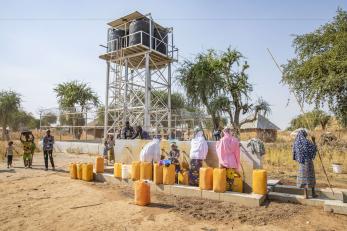
With reliable access to clean water for the past two years, Lele and her family have enjoyed relative peace in their community in Adamawa State, Nigeria. Now, her children bathe every day and don’t get sick as often from polluted water, and her livestock are healthier. In addition to the positive impact on Lele’s family, the longstanding conflict between the farmers in the area and Lele’s community of herders has eased. For years, the Benue River was the main freshwater source within several hundred kilometers for both the herders and the local farmers. Due to the limited access to potable water in most communities in Adamawa, sharing the Benue River became a divisive issue.
For the farmers, the problem was twofold: they didn’t want the herders damaging crops by leading livestock through their farms to gain passage to the river, nor did they want the herders’ livestock contaminating their drinking water. Meanwhile, herders like Lele needed access to the river to wash and keep their livestock hydrated.
These overlapping needs meant years of mounting tension, and violence broke out in 2017, resulting in injuries and deaths. During the height of the attack, Lele’s house was set ablaze, and she fled with her children. Many in the herding community left with no food, water, belongings, or livestock. Some even lost their children. Their exodus took them several hours east, where they set up camp in a desert brush area called Kodomun-Upper. This sudden displacement presented new challenges. First, it was a four-hour walk round trip from the camp to retrieve water. Lele would often make the journey multiple times in a day to get enough water for her family. They were only able to bathe once every four to seven days, and the poor water quality often made her children sick.
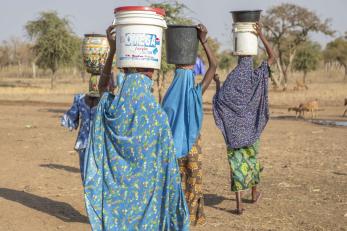
In December 2022, Mercy Corps installed a water point in Kodomun-Upper, allowing consistent, clean water access for all within walking or driving distance. This was a critical step in addressing resource-based violence between the farmer and herding communities, which has resulted in an improved quality of life for all. “We were joyful and we danced and prayed to God for the water,” Lele said.
Bridging the communication gap and sharing resources
Historically, farmer and herder communities in Nigeria enjoyed peaceful relations that developed from a mutually beneficial exchange of resources. After each harvest, farmers allowed herders’ livestock to feed on crop remains while the herders’ livestock fertilized the farms for the next planting season. This symbiotic cycle of cooperation supported a stable foundation between the two groups. However, in recent years, as land and water have become scarcer due to the impacts of climate change, competition for access and control of these resources has escalated. Deep-seated resentments converged around indiscriminate grazing, destruction of farmland, and pollution of water sources, all of which strained farmer-herder relationships.
Worldwide, one in three people do not have access to safe drinking water. Water insecurity can fuel tension and conflict as people compete for access. Enacting laws around the shared use of natural resources in conflict areas often only decreases trust between the government and rural residents, necessitating a different approach. Through a peacebuilding program focused on mitigating conflict over natural resources, Mercy Corps helped to bridge communication between the herders and farmers. By providing mediation training, along with equitable access to clean water for 550 people in the area, Mercy Corps encouraged community-led collaboration to restore peaceful coexistence. The effects of the project have rippled outward, reaching more than 3,300 people in ten wards beyond Kodomun-Upper.
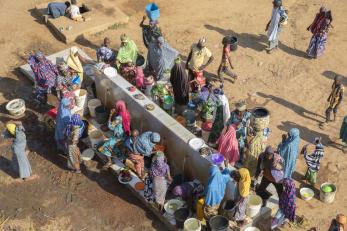
One of the farmers who has benefited directly from the positive effects of the peacebuilding program is Dennis, who lives in Demsa, Adamawa, near the Benue River. Since the age of 12, Dennis has carried on his parents’ legacy by tending the land with inherited knowledge.
Before the water point was installed, fetching water from the river was a daily challenge. Dennis and his family often struggled to find enough water to grow crops and meet their everyday needs, sometimes going weeks without bathing to conserve resources. With receding tides in the dry season, reliable water access becomes virtually nonexistent for months at a time.
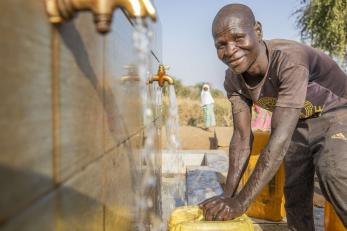
Though it is still a 90-minute walk from Dennis’s home, he now visits the water point multiple times a week, since it is closer than the river and the water is cleaner. Sharing this resource with the herding community has fostered connections and repaired relationships. His children now play with herder children, and he regularly has conversations with herders at the water point.
“We can easily make friends,” Dennis said. “So we should be interacting. Work together. We have to see how good this is.”
Investing in a future of lasting peace
Seven years after fleeing from conflict, Lele sits in the shade of a mudbrick house in her settlement. Looking west, a dirt road extends through miles of brush and sunbaked desert. From the east, the sounds of running water and laughter rings through the air. “The community is now lively,” said Lele. “You can see people smiling always.” Activity buzzes around the water tower, children running to and from the taps with mouthfuls of water. Neighboring communities come to fill canisters and have conversations, which has improved social cohesion and connection.
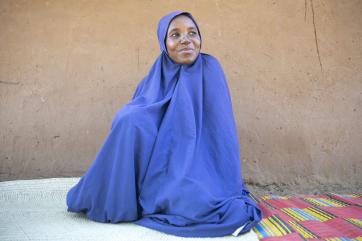
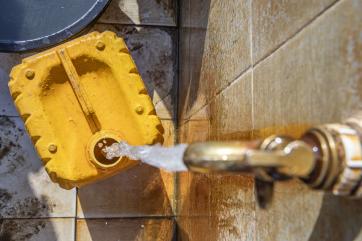
“My kids are now healthier than before.” Lele said. “And the people of this community are happy. They are no longer sad or living without hope.”
Lele’s hope for the future is simple: she wants her kids to go back to school. Without spending so much time fetching water, herders and farmers can commit more time tending to their crops, livestock, and families—making priorities like education feel more possible. Access to education will further strengthen ties between the herder and farmer communities, empowering both groups through knowledge about sustainable resource management. It’s already evident that increasing access to clean water has encouraged communication and locally led collaboration. Mercy Corps’ integrated approach demonstrates how, despite inherently complex and entrenched challenges, peacebuilding is possible.
